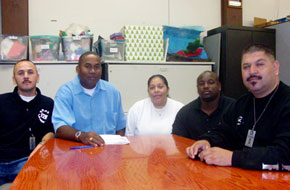
LOS ANGELES (FinalCall.com) – For years, hardcore intervention and prevention workers have helped at-risk youth to avoid gangs, but an era of change and a climate of uncertainty has many of them wondering if programs geared toward saving lives are now at-risk themselves.
The concerns can be attributed to a surge in long-time doubts about effectiveness and calls for program accountability; run-ins with the law by prominent gang intervention workers; prioritization of gang hot zones for funding and support; and the transfer of control over all gang intervention agencies and $19 million in funding to Mayor Antonio Villaraigosa.
There is widespread consensus among law enforcement, political and religious leaders, community activists and residents that gang intervention organizations have been major players in the fight against street violence. But recent debates and power struggles in political circles over who should control gang intervention have signaled that not everyone is convinced that intervention is viable.

Atty. Connie Rice of the Advancement Project told the Final Call problems grew out of the lack of a centralized area of expertise, experience and on-the-ground knowledge to produce and prove positive results.
She said hardcore gang intervention needs integrity checks, money to pay workers regularly and professionalism. In turn, the city needs to know how programs are operating and what their results are, said Ms. Rice.
Atty. Rice supports the consolidation of the programs and believes grassroots intervention is safe.
“There are so few hardcore gang intervention groups, the city knows better than to let any established group with a track record go by the wayside, because it’s hard enough getting skilled, dedicated people. It’s not like they come a dime a dozen; they’re one in a million so the city cannot allow them to go under,” Atty. Rice said.
The Ad Hoc Committee on Gang Violence & Youth Development indicates that the Mayor’s Office currently oversees some 34 gang reduction and youth development programs and grants, including gang suppression. Grants for some of the programs for 2008-2009 were estimated at $5.1 million.
Stan Muhammad, co-founder of the anti-gang program Venice 2000, is concerned that much of the support will go toward police suppression of gangs. He also wonders about neighborhoods outside of the gang hot zones that have forged peace. “Will their success threaten their longevity or existence?” he asked.
According to Atty. Rice, some $900,000 has been allocated to support such neighborhoods.
Mistakes in judgment and character flaws exhibited by some gang intervention workers could be used to justify pulling all funding from these grassroots prevention efforts, some say.
Hector “Big Weasel” Marroquin, founder of the No Guns program which worked against gang and gun violence, was arrested last summer for selling firearms to federal undercover officers. It lost a $1.5 million contract with the city as a result.
Also last year, Maria Corona, a director of the job development program for Communities in Schools, was arrested on suspicion of possessing a pound of methamphetamine.
A recent news report highlighted Steve Myrick, an interventionist who was convicted last year to life in prison for home invasion, robbery, rape and attempted murder in 2000.
Some advocates say labeling all anti-gang interventions led by former gangbangers as bad because of a few people is a contradiction. When a police officer shoots a Black male 50 times, brutalizes or racially profiles someone, the usual refrain is blame the “one bad apple” and not condemn the entire police force.
Mr. Muhammad warned interventionist cannot afford any slip ups. “It may seem kind of harsh, but because our youth’s lives are at stake, I believe that those of us who want to do this work have to remain as clean, as sober as possible,” he said.












